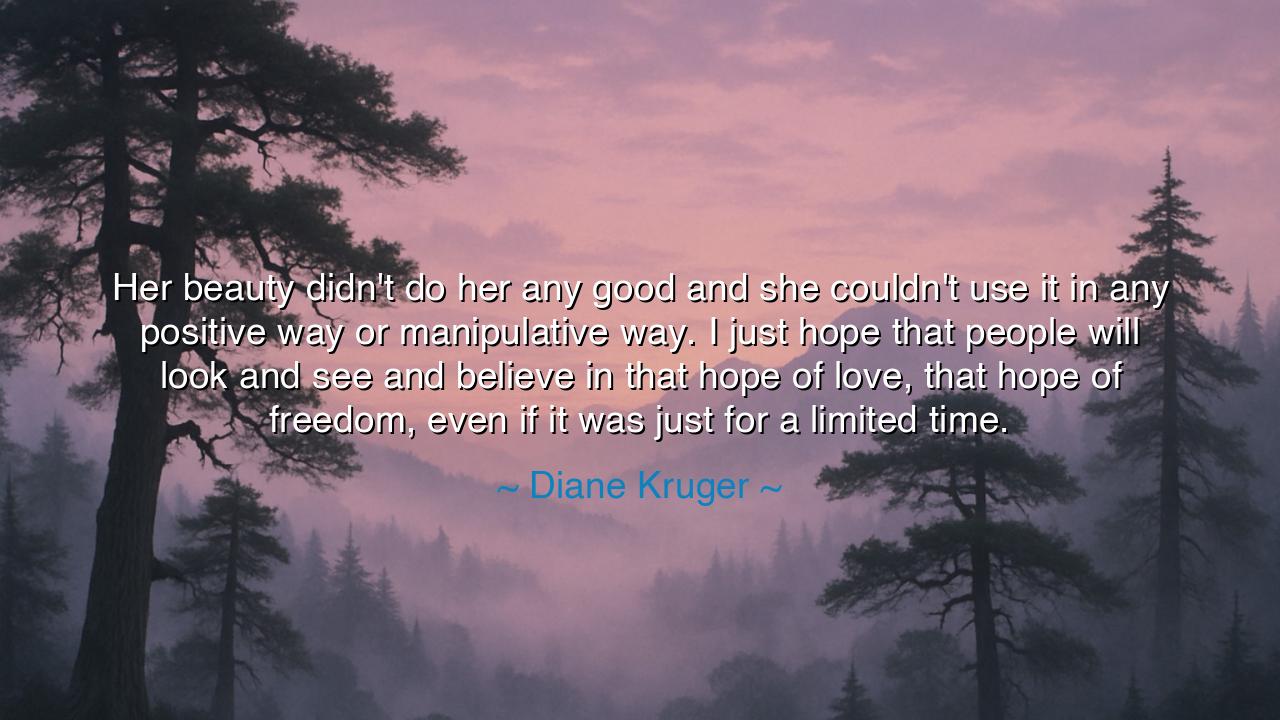
Her beauty didn't do her any good and she couldn't use it in any
Her beauty didn't do her any good and she couldn't use it in any positive way or manipulative way. I just hope that people will look and see and believe in that hope of love, that hope of freedom, even if it was just for a limited time.






Hear the poignant words of Diane Kruger: “Her beauty didn’t do her any good and she couldn’t use it in any positive way or manipulative way. I just hope that people will look and see and believe in that hope of love, that hope of freedom, even if it was just for a limited time.” In this, she speaks of the limits of beauty, and of the higher treasures that surpass the fleeting glow of outward form. For beauty may charm the eye, but it cannot by itself deliver salvation. What endures is the deeper flame—the yearning for love and the unquenchable cry for freedom.
The ancients knew this truth well. Helen of Troy was said to be the fairest of women, her beauty sparking a war that sundered kingdoms. Yet for all her radiance, it brought her neither peace nor happiness. She could not wield it as a shield against sorrow, nor as a weapon to bend destiny to her will. Her tale echoes Kruger’s words: that beauty, when unjoined to virtue or strength, is a fragile vessel easily broken.
Yet from such brokenness can still rise hope. Even if love or freedom endures but for a moment, that moment can light the path for generations. Think of Sophie Scholl, the young German student who stood against tyranny with her brother in the White Rose movement. She had no weapon, no army, and no time. But in her final words, she proclaimed her belief in freedom, and even in her death, she left behind a seed that has inspired countless souls. Here was no manipulation, no ornament of charm, only the pure hope of truth, however brief.
Kruger’s reflection reveals a universal teaching: we must not measure worth by outward gifts or fleeting power, but by the inner force of conviction and the willingness to believe in what is eternal, even when it is fragile. Beauty may fade, freedom may be crushed, love may be cut short, but the memory of their existence, however limited, becomes a torch handed down through time.
So let the generations remember: a single season of true love, a single breath of real freedom, outweighs lifetimes of hollow ornament. The outward form may fail, the glitter of beauty may bring no lasting good, but the spirit that clings to hope becomes immortal. For it is not the face that saves, but the fire within the heart.






TNCao Thanh Nguyen
This quote challenges the typical narrative about beauty, suggesting that it doesn't always translate into power or positive outcomes. Diane Kruger’s focus on hope for love and freedom, even in a limited timeframe, is deeply moving. But what does this say about how people, particularly women, are conditioned to rely on physical beauty to succeed? It makes me think about how society might be evolving to appreciate more than just external appearances.
VKNguyen Thi Van Kieu
The idea that beauty didn’t offer any tangible benefits to her character suggests that there’s something more profound at play in life, something like love and freedom. But is this a reflection of how women are often valued more for their appearance than their inner qualities? The quote makes me think about how we, as a society, often overlook deeper human emotions and connections in favor of surface-level attributes.
HVPhung Ha Vy
It’s a poignant point that beauty, despite its outward appeal, doesn’t always grant power or fulfillment. Diane Kruger seems to be emphasizing that love and freedom are far more meaningful and enduring than appearance alone. But I wonder, how does this apply in a world where beauty can still often open doors and influence decisions? Can we reconcile the value of inner qualities with the weight of physical beauty in today's society?
HTHoangKieu Tran
Diane Kruger's quote reflects an interesting perspective on beauty, implying that external appearances can sometimes be powerless if not backed by deeper values like love and freedom. I wonder if this challenges our cultural obsession with beauty and whether society truly values qualities beyond physical appearance. How much does true beauty lie in one's character, and can we move away from superficial judgments to embrace more lasting qualities?